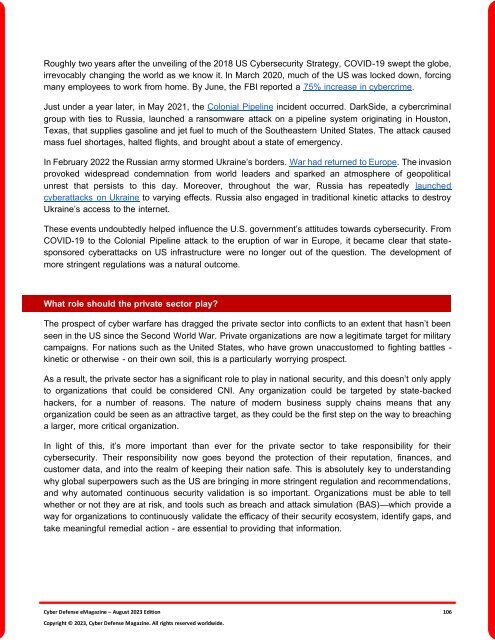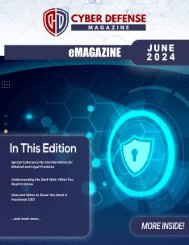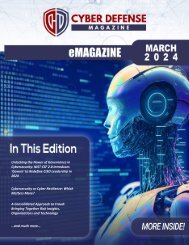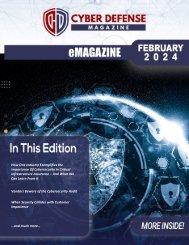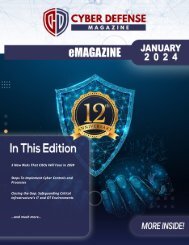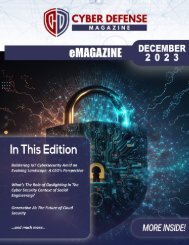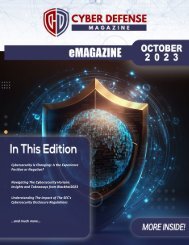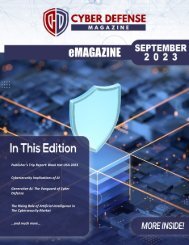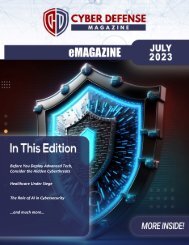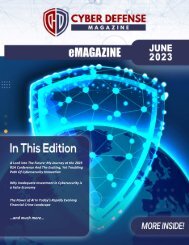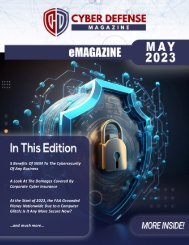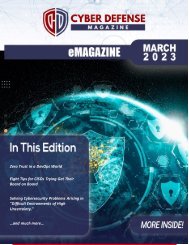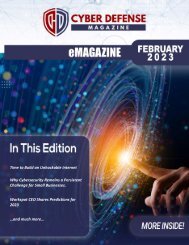The Cyber Defense eMagazine August Edition for 2023
Cyber Defense eMagazine August Edition for 2023 #CDM #CYBERDEFENSEMAG @CyberDefenseMag by @Miliefsky a world-renowned cyber security expert and the Publisher of Cyber Defense Magazine as part of the Cyber Defense Media Group as well as Yan Ross, Editor-in-Chief and many more writers, partners and supporters who make this an awesome publication! Thank you all and to our readers! OSINT ROCKS! #CDM #CDMG #OSINT #CYBERSECURITY #INFOSEC #BEST #PRACTICES #TIPS #TECHNIQUES
Cyber Defense eMagazine August Edition for 2023 #CDM #CYBERDEFENSEMAG @CyberDefenseMag by @Miliefsky a world-renowned cyber security expert and the Publisher of Cyber Defense Magazine as part of the Cyber Defense Media Group as well as Yan Ross, Editor-in-Chief and many more writers, partners and supporters who make this an awesome publication! Thank you all and to our readers! OSINT ROCKS! #CDM #CDMG #OSINT #CYBERSECURITY #INFOSEC #BEST #PRACTICES #TIPS #TECHNIQUES
Create successful ePaper yourself
Turn your PDF publications into a flip-book with our unique Google optimized e-Paper software.
Roughly two years after the unveiling of the 2018 US <strong>Cyber</strong>security Strategy, COVID-19 swept the globe,<br />
irrevocably changing the world as we know it. In March 2020, much of the US was locked down, <strong>for</strong>cing<br />
many employees to work from home. By June, the FBI reported a 75% increase in cybercrime.<br />
Just under a year later, in May 2021, the Colonial Pipeline incident occurred. DarkSide, a cybercriminal<br />
group with ties to Russia, launched a ransomware attack on a pipeline system originating in Houston,<br />
Texas, that supplies gasoline and jet fuel to much of the Southeastern United States. <strong>The</strong> attack caused<br />
mass fuel shortages, halted flights, and brought about a state of emergency.<br />
In February 2022 the Russian army stormed Ukraine’s borders. War had returned to Europe. <strong>The</strong> invasion<br />
provoked widespread condemnation from world leaders and sparked an atmosphere of geopolitical<br />
unrest that persists to this day. Moreover, throughout the war, Russia has repeatedly launched<br />
cyberattacks on Ukraine to varying effects. Russia also engaged in traditional kinetic attacks to destroy<br />
Ukraine’s access to the internet.<br />
<strong>The</strong>se events undoubtedly helped influence the U.S. government’s attitudes towards cybersecurity. From<br />
COVID-19 to the Colonial Pipeline attack to the eruption of war in Europe, it became clear that statesponsored<br />
cyberattacks on US infrastructure were no longer out of the question. <strong>The</strong> development of<br />
more stringent regulations was a natural outcome.<br />
What role should the private sector play?<br />
<strong>The</strong> prospect of cyber warfare has dragged the private sector into conflicts to an extent that hasn’t been<br />
seen in the US since the Second World War. Private organizations are now a legitimate target <strong>for</strong> military<br />
campaigns. For nations such as the United States, who have grown unaccustomed to fighting battles -<br />
kinetic or otherwise - on their own soil, this is a particularly worrying prospect.<br />
As a result, the private sector has a significant role to play in national security, and this doesn’t only apply<br />
to organizations that could be considered CNI. Any organization could be targeted by state-backed<br />
hackers, <strong>for</strong> a number of reasons. <strong>The</strong> nature of modern business supply chains means that any<br />
organization could be seen as an attractive target, as they could be the first step on the way to breaching<br />
a larger, more critical organization.<br />
In light of this, it’s more important than ever <strong>for</strong> the private sector to take responsibility <strong>for</strong> their<br />
cybersecurity. <strong>The</strong>ir responsibility now goes beyond the protection of their reputation, finances, and<br />
customer data, and into the realm of keeping their nation safe. This is absolutely key to understanding<br />
why global superpowers such as the US are bringing in more stringent regulation and recommendations,<br />
and why automated continuous security validation is so important. Organizations must be able to tell<br />
whether or not they are at risk, and tools such as breach and attack simulation (BAS)—which provide a<br />
way <strong>for</strong> organizations to continuously validate the efficacy of their security ecosystem, identify gaps, and<br />
take meaningful remedial action - are essential to providing that in<strong>for</strong>mation.<br />
<strong>Cyber</strong> <strong>Defense</strong> <strong>eMagazine</strong> – <strong>August</strong> <strong>2023</strong> <strong>Edition</strong> 106<br />
Copyright © <strong>2023</strong>, <strong>Cyber</strong> <strong>Defense</strong> Magazine. All rights reserved worldwide.


